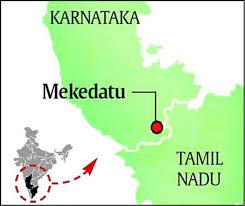
Mekedatu Dam Project
Mekedatu Dam Project , RACE IAS : Best IAS Ccoaching in Kanpur
Main Examination: General Studies Paper 2
(Governance, Inter-State Relations, Federalism)
In News:
- In recent times, the dispute over the sharing of water between the states of Karnataka and Tamil Nadu over the construction of the Mekedatu Dam Project on the Kaveri River has resurfaced once again.
What is Controversy:
- Disagreement between Karnataka and Tamil Nadu over Cauvery water dates back to the time when they did not exist and the issue revolves around the principle that the upper riparian state (Karnataka) must seek the consent of the lower riparian state (Tamil Nadu) for any construction activities on the river.
- In 1990, the Cauvery Water Disputes Tribunal (CWDT) was set up to settle the matter, and in 2007 it issued its final order on water sharing. The Indian Supreme Court has upheld the 2018 order reducing Karnataka's water allocation to Tamil Nadu.
Mekedatu Dam Project:
- Mekedatu is a multipurpose balancing reservoir project that focuses on power generation and drinking water supply in the region. Mekedatu means "goat's leap" in Kannada.
- The Mekedatu Balancing Reservoir and Drinking Water Project has both financial and social benefits as it is proposed to plan to provide drinking water to about 100 million people with the added benefit of generating 400 MW of electricity. The project aims to conserve water, prevent energy shortage and provide drinking water facilities to Bangalore cities and surrounding areas in the Kaveri basin.
- In 1996, the project was first planned by the Karnataka Power Corporation to meet the water and electricity needs of the people in Bengaluru and surrounding districts. In 2013, the Karnataka government announced the project and submitted a detailed project report to the Center on its plans in 2019.
- The government aims to build a reservoir at Mekedatu in Ramanagara district of Karnataka, about 110 km from Bangalore and 4 km from the Tamil Nadu border.
- With an estimated budget of Rs 9,000 crore, a reservoir is to be built at the confluence of Kaveri and its tributary Arkavathi.
- The Mekedatu dam will be bigger than the Krishnaraja Sagar project on the Kaveri. The Central Water Commission (CWC) had approved the feasibility study for the project in 2018.
Significance of the Project:
- It aims to supply drinking water to Bengaluru and surrounding areas.
- This project will help the city to deal with the water problem.
- Currently, more than 30% of borewells in Bangalore depend on water from this project.
- There is also a plan to generate 400 MW power from this project in future.
- The revenue earned from the power generation of this project is expected to be a huge economic benefit to the government within a few years.
Cauvery Water Dispute:
- The rift between the states over Cauvery water continues from pre-independence India. In 1892, a dispute arose between the then Presidency of Madras and the princely state of Mysore under British rule, when the latter proposed to build an irrigation system on the Kaveri. But contrary to the same reasons that the upstream state can control the water.
- In the year 1924, an agreement enabled the construction of the Krishnaraja Sagar Dam and decided the allocation of Cauvery water among the states. The agreement had a time limit of 50 years and after its expiry, the dispute flared up again.
- Thus, Tamil Nadu approached the Center to set up a tribunal to decide the allocation of water among the states.
- In the year 1990, the tribunal was set up and water was allocated to Karnataka (270 tmcft), Kerala (30 tmcft), Puducherry (97 tmcft) and Tamil Nadu (419 tmcft) in 2007 and in rain deficient years the allocation will be reduced.
Concerns related to this project:
- As the land proposed for submergence is home to some endangered species. Hence this project may adversely affect their natural habitat.
- As the project is under construction on the Kaveri River and the sharing of the river's water is disputed between Tamil Nadu and Karnataka, getting clearance from the central government and the Supreme Court to start the project could be challenging.
- Tamil Nadu opposes any project in the upper riverbank without the approval of the Supreme Court. Tamil Nadu argues that the project is unauthorized and may harm its interests, violating orders of the Cauvery Water Disputes Tribunal and the Supreme Court.
About Kaveri River:
- Kaveri river is also known as 'Ponni' in Tamil language.
- It rises in the Brahmagiri range of the Western Ghats and reaches the Bay of Bengal south of Cuddalore in Tamil Nadu.
- Its tributaries are: Harangi, Bhavani, Laxman Tirtha, Noyyal, Arkavati, Amaravati, Hemavati and Kabini.
- The Cauvery basin is spread over the states of Karnataka, Tamil Nadu and Kerala and the Union Territory of Puducherry.
Way Forward:
- A dam is capable of meeting the needs of a water-scarce city to a large extent, so care must be taken to ensure environmental compliance and carry out a proper environmental impact assessment.
- Also, the principles of cooperative federalism should be promoted to control inter-state disputes arising out of any river water dispute.
Source: The Hindu
--------------------------------
|
Mains Exam Question Discuss the social and economic benefits of the multipurpose project Mekedatu. |